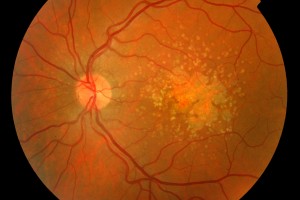 Age-related macular degeneration (AMD) is an eye condition that affects a tiny part of the retina at the back of your eye, which is called the macula.
Age-related macular degeneration (AMD) is an eye condition that affects a tiny part of the retina at the back of your eye, which is called the macula.
AMD causes problems with your central vision, but does not lead to total loss of sight and is not painful. AMD affects the vision you use when you’re looking directly at something, for example when you’re reading, looking at photos or watching television. AMD may make this central vision distorted or blurry and, over a period of time, it may cause a blank patch in the centre of your vision.
At Family Eyecare, our optometrists will check for any signs of developing AMD if at all, and will arrange management of this as deemed appropriate. Taking our Premier Examination will also help to determine if there is a possibility of AMD developing later on in life, and if so you will be advised of the steps that can be taken to try and prevent or at least lessen the effects of AMD occurring.
At the moment, the exact cause for AMD is not known. Some things are thought to increase your chances of developing AMD:
- Age: AMD develops as people grow older and is most often seen in people over the age of 65, although it can develop in people who are in their forties and fifties
- Gender: more women have AMD than men, probably because women tend to live longer than men.
- Genes: some genes have been identified which seem to be linked to the development of AMD in some people.
- Smoking: smoking greatly increases your risk of developing AMD. Studies also show that stopping smoking can reduce your risk of developing AMD
- Sunlight: some studies suggest that exposure to high levels of sunlight (particularly the UV light contained in sunlight) throughout your life may increase your risk of developing AMD. Wearing sunglasses to protect your eyes from the UV light in sunlight is a good idea for everyone throughout their life
- What you eat: a number of studies have looked at diet as a risk factor for someone developing AMD. At the moment there isn’t agreement on how much of a risk factor diet is. There is some evidence that vitamins A, C and E and zinc may help to slow the progression of AMD in people who already have the condition.
Although you cannot change your age or genes, current thinking is that protecting your eyes from the sun, eating a balanced diet with plenty of fresh fruit and vegetables, and stopping smoking may all help to keep your eyes as healthy as possible. Unfortunately, because the exact cause of AMD is not known you may develop this condition even if you don’t have any of these risk factors.
The following animation is a good demonstration of the characteristics of AMD and what it looks like inside your eye. (There is no sound to this clip.)
